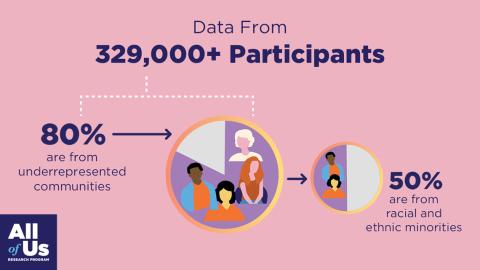All of Us Releases First Genomic Dataset

NIH’s All of Us Research Program has released the whole genome sequences from nearly 100,000 participants. About half of the data comes from individuals who identify with racial or ethnic groups that have historically been underrepresented in research. This data will enable researchers to address yet unanswerable questions about health and disease, leading to new breakthroughs and advancing discoveries to reduce persistent health disparities.
“Until now, over 90 percent of participants from large genomics studies have been of European descent,” said All of Us CEO Dr. Josh Denny. “All of Us participants are leading the way toward more equitable representation in medical research through their involvement. And this is just the beginning.”
The genomic data is available via a cloud-based Workbench at https://www.researchallofus.org/. The research hub also includes genotyping arrays from 165,000 participants. Whole genome sequencing provides information about almost all of an individual’s genetic makeup, while genotyping arrays, the more commonly used genetic testing approach, capture a specific subset of the genome.

In addition to the genomic data, the Workbench contains an array of other deidentified participant information to help researchers better understand how genes can cause or influence diseases in the context of other health determinants. The ultimate goal is to enable more precise approaches to health care for all populations.
“As the Researcher Workbench matures, it will create nearly endless possibilities for discovery to understand the role of genes and variants, as well as many other factors that combine to affect health and disease,” said Dr. Gail Jarvik, who heads the division of medical genetics at the University of Washington School of Medicine, Seattle.
All of Us works with a consortium of partners across the country to help reach participants and collect data and samples, including community organizations and medical centers. The Researcher Workbench is managed by Vanderbilt University Medical Center in collaboration with the Broad Institute of MIT and Harvard and Verily.
Plans are underway to begin to share health-related DNA results on hereditary disease risk and medication-gene interactions later this year.
